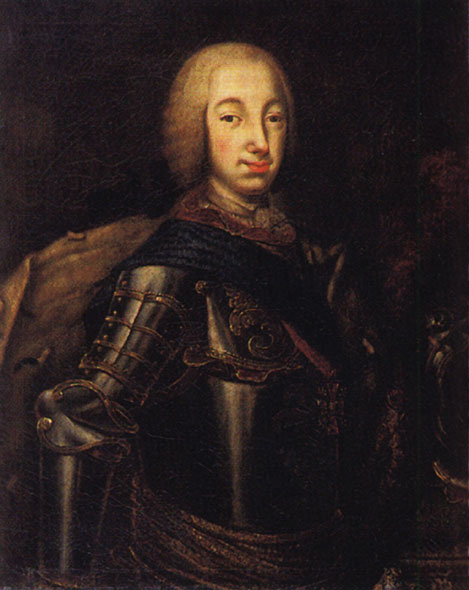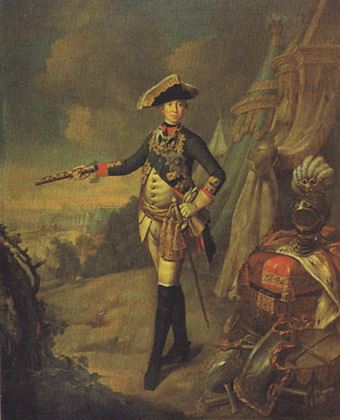<Back to Index>
- Historian Louis Pierre Anquetil, 1723
- Classical Guitarist Andrés Torres Segovia, 1893
- Emperor and Autocrat of All the Russias Peter III, 1728
PAGE SPONSOR


Peter III (21 February 1728 – 17 July [O.S. 6 July] 1762) (Russian: Пётр III Фëдорович, Pyotr III Fyodorovitch) was Emperor of Russia for six months in 1762. According to most historians, he was mentally immature and very pro-Prussian, which made him an unpopular leader. He was supposedly assassinated as a result of a conspiracy led by his wife, who succeeded him to the throne as Catherine II.
Peter was born in Kiel, Schleswig - Holstein. His parents were Karl Friedrich, Duke of Holstein - Gottorp (nephew of Charles XII of Sweden) and Anna Petrovna, a daughter of Emperor Peter the Great of Russia and his second wife, Catherine I of Russia. His mother died less than two weeks after his birth. In 1739, Peter's father died, and he became Duke of Holstein - Gottorp as Karl Peter Ulrich. He could thus be considered the heir to both thrones (Russia and Sweden).
When Anna's sister Elizabeth became Empress of Russia she brought Peter from Germany to Russia and proclaimed him her heir in the autumn of 1742. Previously in 1742 the 14 year old Peter was proclaimed King of Finland during the Russo - Swedish War (1741 – 1743) when Russian troops held Finland. This proclamation was based on his succession rights to territories held by his childless granduncle, the late Charles XII of Sweden who also had been Grand Duke of Finland. About the same time, in October 1742, he was chosen by the Swedish parliament to become heir to the Swedish throne. However, the Swedish parliament was unaware of the fact that he had also been proclaimed heir to the throne of Russia, and when their envoy arrived in Saint Petersburg it was too late. It has been reported that the underage Peter's succession rights to Sweden were renounced on his behalf (such an act in name of a minor has been regarded as questionable and probably invalid).
Empress Elisabeth arranged for Peter to marry his second cousin, Sophia Augusta Frederica (later Catherine the Great), daughter of Christian August, Prince of Anhalt - Zerbst and Johanna Elisabeth of Holstein - Gottorp. The young princess formally converted to Russian Orthodoxy and
took the name Ekaterina Alexeievna. They married in 1745. The marriage
was not a happy one, but produced one son: the future Emperor Paul;
and one daughter: Anna Petrovna (20 December 1757 – 19 March
1759). Catherine later claimed that Paul was not fathered by Peter,
that, in fact, they had never consummated the marriage. During the sixteen years of their residence in Oranienbaum Catherine
took numerous lovers, as did her husband. Although the story was much
aired by Paul's enemies, it may have been an attempt to cast doubt on
Paul's right to the throne, in order to prop up Catherine's own
somewhat shaky claim. Paul physically resembled Peter, so one may doubt
the claims of illegitimacy. The classical view of Peter's character is contained in the 1911 Encyclopaedia Britannica: Nature
had made him mean, the smallpox had made him hideous, and his degraded
habits made him loathsome. And Peter had all the sentiments of the
worst kind of small German prince of the time. He had the conviction
that his princeship entitled him to disregard decency and the feelings
of others. He planned brutal practical jokes, in which blows had always
a share. His most manly taste did not rise above the kind of military
interest which has been defined as "corporal's mania," the passion for
uniforms, pipeclay, buttons, the "tricks of parade and the froth of
discipline." He detested the Russians, and surrounded himself with
Holsteiners. After Peter gained the throne in 1762, he incurred many nobles' displeasure by withdrawing from the Seven Years' War and making peace with Prussia, in which Russia did not gain anything, in spite of Russia's occupation of Berlin and virtual victory in the war. He formed an alliance with Prussia and planned an unpopular war against Denmark in order to restore Schleswig to
his Duchy of Holstein - Gottorp. Denmark, unable to find any allies to
resist Russian aggression and short of finance to fund a war, invaded
the free city of Hamburg in northern Germany to gain money. Peter was outraged by this considering it a casus belli, and prepared for open warfare against Denmark. While
historically Peter's planned war against Denmark was seen as being an
obsessive madness, recent scholarship has portrayed it as part of a
pragmatic plan to expand Russian power westwards — he saw gaining
territory and influence in Denmark and Northern Germany as more useful
to Russia, than taking East Prussia. Equally, he saw that friendship towards Prussia and Britain, following its triumph in the Seven years War, could offer more to aid his plans than either Austria or France. During
Peter's short reign, Russia saw several minor but important economic
reforms that encouraged development of Western European style capitalism and mercantilism and
to move away from Russia's traditional social practices of subjugating
peasants and townspeople and reserving leading positions for nobility.
He issued an edict abolishing the practice allowing industrialists to
purchase serfs as workers for their enterprises. He also forbade the importation of sugar into Russia to stimulate domestic manufacturing. A Physiocrat he
declared free trade which broke the power of the Russian middle class.
They had lost access to serfs along with most protective tariffs
(internal tariffs were abolished in 1753). Peter's major social reform was the introduction of the Liberty for Nobility, abrogating Peter the Great's policy of forcing all male members of Russian nobility to serve in the military or civil service without regard for individual preference for a particular occupation. In addition, he also pressured the Russian Orthodox Church to adopt Lutheran practices.
All church land and serfs were taken by the state, something Elizabeth
had refused to do. Peter never even became Orthodox. Catherine, along with her lover Grigori Orlov, planned to overthrow Peter, as she believed he would dispose of her in order to marry his mistress Elisabeth Vorontsova. The Leib Guard,
on which Peter planned to impose harsher discipline, revolted and Peter
was arrested and forced to abdicate; Catherine became Empress with the
support of most of the nobility. Shortly thereafter, Peter was killed while in custody at Ropsha. While Catherine did not punish the responsible guards, doubts remain as to whether she ordered the murder or not. Catherine largely reversed the reforms of Peter III and abandoned the planned war with Denmark. The Cossack peasant Pugachev later
claimed to be Peter III (promoting a rumour that Peter had not died,
but had secretly been imprisoned by Catherine). Under this guise, he
led what came to be known as Pugachev's Rebellion in 1774 which was ultimately crushed by Catherine's forces. In December 1796 after succeeding Catherine, Peter's son the Emperor Paul, who disliked his mother, arranged for his remains to be exhumed and then reburied with full honors in the Peter and Paul Cathedral, where other tsars were buried. There
have been many attempts to revise the traditional characterisation of
Peter and his policies, which were obviously influenced by his wife's
memoirs and other biased accounts. It was during his reign that some of
Catherine's reforms were prepared. Most recently, the German writer and
journalist Elena Palmer wrote a revisionist history of Peter III with her book Peter III - The Prince of Holstein (Sutton Publishing/Germany/2005). Peter has been depicted on screen a number of times, almost always in films concerning his wife Catherine. He was portrayed by Douglas Fairbanks Jr in the 1934 film The Rise of Catherine the Great and by Sam Jaffe in The Scarlet Empress the same year. In 1991 Reece Dinsdale portrayed him in the television series Young Catherine. Peter appeared as a character in the anime Le Chevalier D'Eon. He possesses an intense hatred of his aunt, the Empress Elizabeth, and proceeds to scream at her coffin. He threatens the life of Ekaterina, Catherine the Great, as well. He is deposed and dragged off as Katerina seizes control of Russia. He is voiced by Jose Diaz in the English adaptation and Masatoshi Iida in the Japanese adaptation.